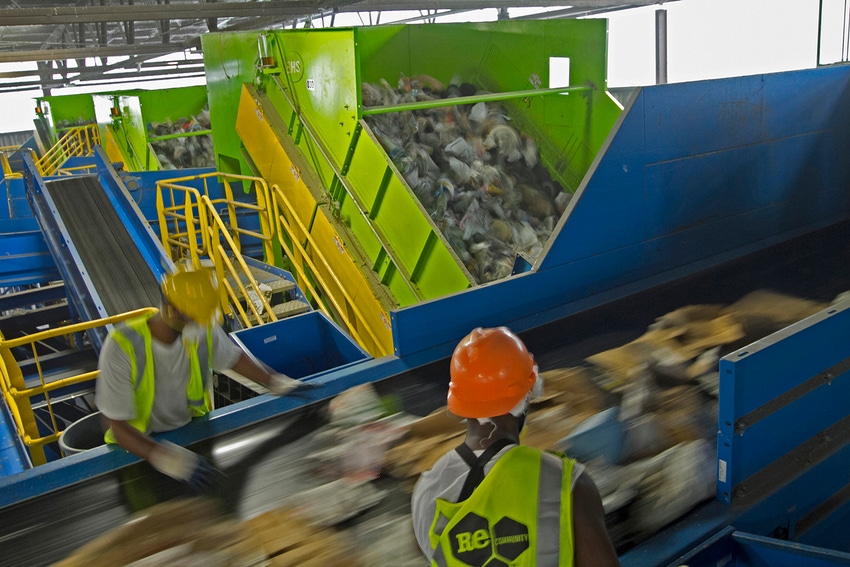This disconnect about how recycling can play a vital role in solving many environmental crises is our own fault.

I’ll stop short of saying that recycling has fallen from its graces, but I think few would argue we’re in our glory years. Recycling rates have stagnated for the last decade, contamination rates are skyrocketing, commodity markets continue to slide, and there are a lot of fundamental questions arising around how we evolve to handle a changing material stream with more plastics and composite packaging.
Yet what I find most alarming aren’t these challenges mentioned above, but rather the lack of understanding about why we recycle and the “been there, done that” attitude that recycling has run its course. While sustainability, climate resilience and circular economy continue to gain momentum, the importance of recycling, and its relevance to all these issues, seems lost. Check out the agenda of any major environmental or sustainability conference and you’ll be hard pressed to find a single session on recycling. We’ve become the awkward fifth wheel at the sustainability party, invited out of courtesy but relegated to the back corner of the room.
Recycling is core to solving some of the greatest issues of our time, so getting back in step with the environmental movement is paramount to helping us help the planet. We need to better understand where we’ve gotten off track, and how we can get back on.
Missing the relevance of why it matters
“Waste isn’t a problem we’re working on right now. We are working on bigger issues like… [insert climate change, social justice, air pollution, green jobs.]” I’ve heard some version of this line of reasoning from countless city managers, mayors and even environmental groups around the country. While recycling was once a pillar of the environmental movement, there is now a dangerous myth that recycling doesn’t help these other issues and instead is a distraction from “more important” work.
This couldn’t be further from the truth. Recycling, for example, is one of the best ways to save energy in the extraction, processing and manufacturing of products and packaging. By decreasing energy use through recycling, the U.S. reduces greenhouse gas emissions by the equivalent of taking over 38 million cars off the road every year.
Additionally, recycling is a smart investment in more resilient local economies—by doubling our recycling rate to 75 percent by 2030, we could create 1.1 million new jobs.
Frankly, this disconnect about how recycling can play a vital role in solving many environmental crises is our own fault. We have a branding challenge. We’ve too long associated ourselves only with saving space in landfills, extending landfill life or reducing groundwater pollution from landfills. Today’s modern landfills are not only safer, they are also farther away, and with that, out of sight, out of mind. U.S. communities have moved past landfills as the impetus to recycle, and our messaging needs to evolve to align with the focus on climate change, green jobs, plastics pollution and social justice.
Been there, done that
In addition to re-educating cities and citizens on why recycling matters, we also need to address the nonchalant “been there, done that” attitude toward recycling. For the millions of Americans with curbside recycling, recycling is taken for granted—we’ve met our goal, check recycling off the list and move on to other sustainability initiatives.
But let’s take a hard look at where we really are. Only 50 percent of Americans automatically have curbside recycling included alongside trash service, so for the other half of the country, throwing something away is still easier and often cheaper. Composting is only available to 2 percent of U.S. households, even though more than one-third of our discards could be composted.
That’s just single-family homes. Business recycling is a huge untapped opportunity to reduce greenhouse gas emissions and create green jobs. That’s why it was one of the first policies California adopted as part of its landmark climate change legislation back in 2006.
The truth is, we have a decent foundation with single-family recycling in most communities, but we’ve barely scratched the surface on composting, commercial recycling, or waste reduction and reuse. We’re a long, long way from mission accomplished.
Back on track
This blog isn’t a desperate attempt to find new ways to promote recycling to serve our own self-interests. These environmental and social issues keep me up at night too, and I’m frustrated that we’re missing a viable solution. We need to help decision-makers and citizens understand recycling is a key part of the toolbox of solutions, not an unrelated side project.
I’m excited when I present at conferences as part of the energy or climate track. That’s what recycling is—it’s not a waste solution, but a path to reduce energy, mitigate climate change, create green jobs, cut plastic pollution in our oceans, fight social injustices, conserve natural resources and so much more. Let’s dust off our “trashy” image, stop selling ourselves short and start taking credit for the great work we already do, and the even greater potential we can achieve.
Kate Bailey is the project director of Eco-Cycle Solutions and works with citizens, government staff and elected officials to implement zero waste solutions around the U.S.
About the Author(s)
You May Also Like


